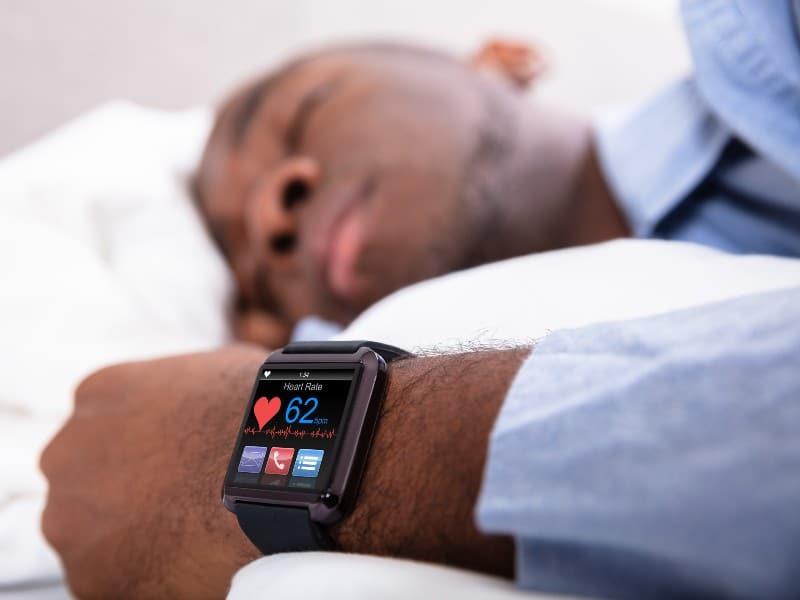It’s no secret that getting enough sleep is essential to our health. But did you know that a restless night may be a symptom of an ailing heart?
Having a hard time breathing when lying down could be a sign of heart failure, says cardiologist Anas Alomar, MD, FACC, FSCAI, ABVM, medical director of cardiology on the medical staff at Methodist Southlake Medical Center. That’s because the excess fluid that settles in the legs and feet while a patient is upright moves to their chest when they lie down.
“Sleep and heart health are really a two-way street,” Dr. Alomar says. “Sleeping poorly can be a tell-tale sign of heart trouble, while not getting enough sleep over time can lead to serious health problems.”
Congestive heart failure is just one of the potential ailments — including weight gain, diabetes, stroke, and depression — that go hand in hand with getting too little sleep. And far too many of us are at risk because we get 1 ½ to 2 hours less sleep per night than Americans did half a century ago, Dr. Alomar says.
“Insufficient sleep has been identified as a public health epidemic per the Centers for Disease Control and Prevention,” Dr. Alomar said. “More than 1 in 3 American adults say they don’t get the recommended amount of sleep.”
If you’re among the millions of people who don’t get enough shut-eye, here’s some advice from Dr. Alomar and other health experts:
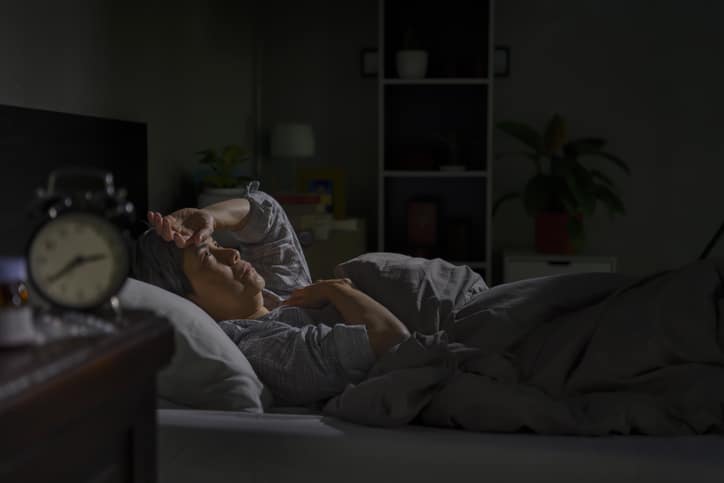
IS THERE AN IDEAL BEDTIME?
A new study made headlines in late 2021 saying the “perfect” bedtime for cardiovascular health falls between 10 and 11 p.m.
Among the U.K. study’s 88,000 participants, there was a 25% higher risk of heart problems among those who fell asleep after midnight and a 12% percent higher risk among those who went to bed between 11 p.m. and midnight. On the earlier side of that “golden hour,” the risk was 24% higher among participants who went to sleep before 10 p.m.
But let’s keep it simple: The ideal time to go to sleep is when you’re tired. We all have different schedules, and disrupting them just to adhere to an ideal bedtime may make matters worse.
“As creatures of habit, people have a hard time adjusting to changes in sleep patterns,” Dr. Alomar said.
A bedtime routine is critical to ensuring the rest you get at night is worthwhile. And when you go to sleep before you’re tired, you may be setting yourself up for a restless night by reinforcing the idea that a bed is for waking hours.
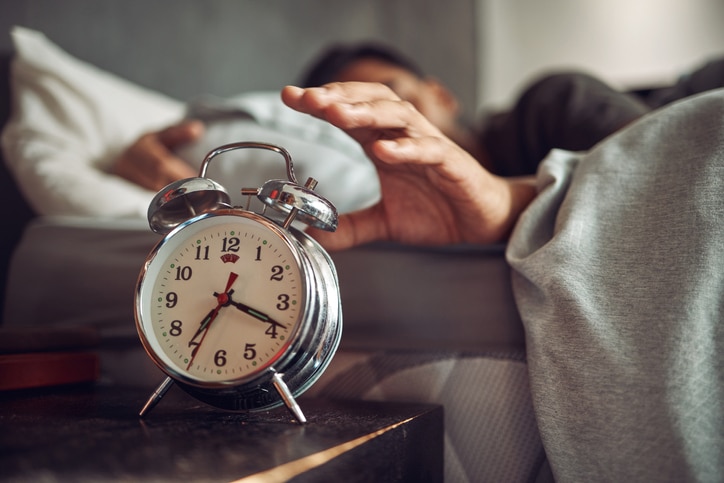
TWO ALARMS ARE BETTER THAN ONE
Forcing yourself to go to sleep when you’re not tired may be counterproductive, but it’s possible to retrain your brain with a few helpful cues.
“Try setting an alarm for bedtime,” Dr. Alomar suggests. “Often, we set alarms for when it’s time to wake up but fail to do so for when it’s time to go to sleep.”
Many people swear by a morning routine to set themselves up for a successful day, but there’s value in a bedtime ritual, too.
Take a warm shower, practice mindfulness or meditation, or try some yoga or stretches each night to help you wind down from the anxiety of the day. All of the above can serve as nightly cues to put your mind in a restful state.
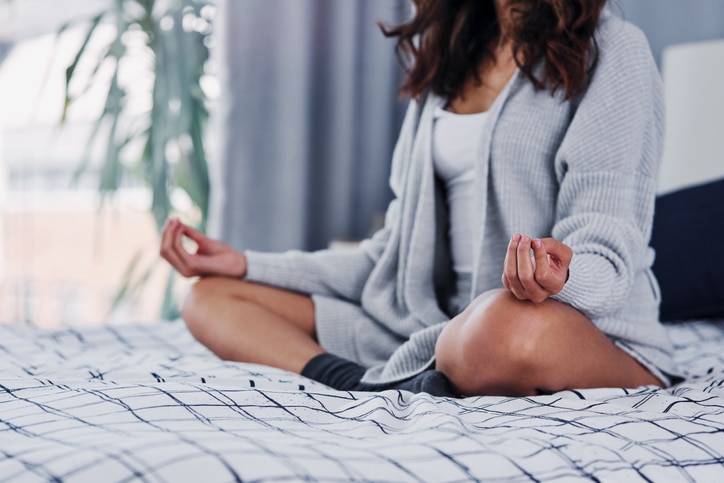
DON’T TRY TO PLAY CATCH-UP
Many people who rack up a sleep deficit during the workweek try to make up for it on the weekend, either by sleeping in or napping. But it’s not an even trade.
“Sleeping later on weekends won’t fully make up for a lack of sleep during the week and will make it harder to wake up early on Monday morning,” Dr. Alomar says.
After all, you wouldn’t try to make up for a week’s worth of indulging fast food cravings by eating nothing but fruits and vegetables on the weekend. The same holds true for sleeping.
Instead, practice good sleep habits during the week and carry them through to the weekend. This weekend, try setting an alarm for the same time you wake up Monday through Friday.
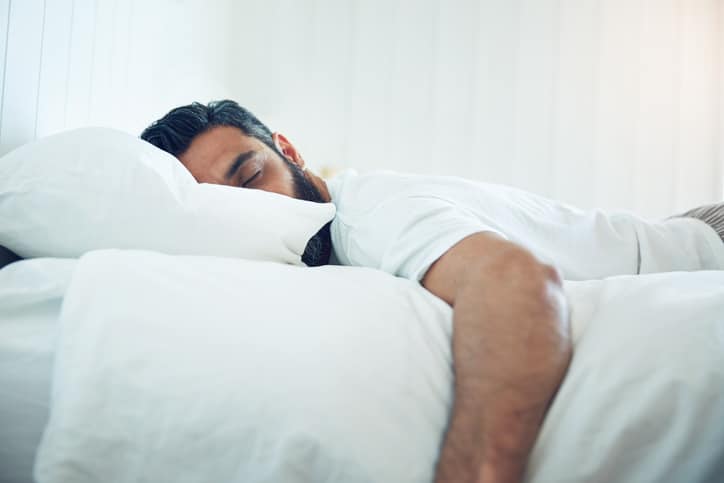
DIET AND EXERCISE ARE KEY
Sleep aids like melatonin and certain antihistamines (those over-the-counter remedies with “PM” in the name) have become an all-too-common fix during the pandemic. But supplements and sedatives are a temporary solution, at best, and making some dietary changes may be more effective.
“Lifestyle factors such as diet and exercise may reduce the risk of heart disease, both directly and indirectly, by fostering better sleep,” Dr. Alomar says.
Skip spicy foods, for example, or the accompanying heartburn may keep you awake. Similarly, foods that are high in fat or protein are harder to digest and can disrupt your circadian rhythm. Also, drinking alcohol before bed may help you fall asleep more quickly, but when it wears off, your quality of sleep will suffer. What’s more, it may also aggravate sleep apnea for chronic snorers.
Finally, adding an exercise routine a few hours before bedtime can help burn off extra energy before bedtime rolls around.
“This, in turn, may lead to a better outlook and more energy,” Dr. Alomar says, “an excellent type of feedback circuit.”

